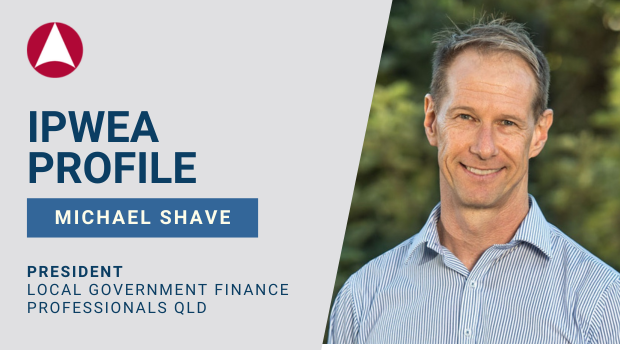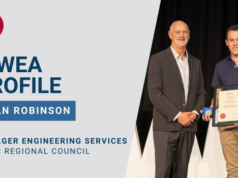What do Olympic champion Kieren Perkins, minister for infrastructure, transport and regional development, Catherine King, and the president of the Local Government Finance Professionals (LGFP) Queensland, Michael Shave, have in common?
As it turns out, they’re all speaking at the Institute of Public Works Engineering Australasia (IPWEA) International Asset Management Congress in Canberra in November.
“It’s them, and then me,” says Shave with a laugh, adding “I don’t have the profile, do I?”
Of course, within Queensland local government, where he’s been a veteran of the scene for 25 years, and among financial and accounting professionals, Shave certainly does have “the profile”.
Specialising in providing strategic financial support and advice within the local government industry, Shave plays an important role in highlighting and strengthening the focus on asset management in the sector, which he argues has the largest single influence on local government sustainability.
“In my current consulting capacity we have been assisting Norfolk Island Council, have been working with Logan and Townsville City Councils, and many Indigenous councils as well, assisting with a number of financial and other related projects to facilitate informed decision making especially around making good financial decisions,” says Shave, who has currently just commenced a six-month stint working in rural Barcaldine, Queensland, a complete change of scenery from his home in Noosa.
“We provide a lot of support to councils in terms of helping them with asset valuations and asset recognition, reviewing depreciation policies, asset management policies, their non-current asset accounting policies,” he explains, adding it’s all about getting the infrastructure teams and the finance teams working together, streamlining processes around asset valuations, condition assessments and strategic asset planning, “looking at future investment requirements for renewals and replacement works so that financial plans reflect these needs.”
In the recent LGFP submission to the Federal Government’s inquiry into local government sustainability, the LGFP identified eight key themes or challenges contributing to financial sustainability challenges for local government. Shave will discuss some of these at the IPWEA conference.
They include how to assist Indigenous and rural or remote councils that struggle to attract and retain the necessary skilled financial staff resources to maintain effective business continuity; how to better manage commonwealth and state government grant funding programs with a focus on new infrastructure; and how to ensure ongoing training and education for state and territory local government departments, elected members and senior local government executives on financial and asset management.
Shave holds a Bachelor of Business (Accounting) and Bachelor of Arts (History), is a fellow of CPA Australia and a graduate of the Australian Institute of Company Directors. Ensuring better financial sustainability outcomes for local governments is in his wheelhouse.
The recent reporting by the Queensland Audit Office of $1.3b in council found assets over the past five years – including road surfaces, earthworks, footpaths, and curb and channel – is a case in point about the impact the asset numbers have on financial sustainability.
“We see this as a real opportunity area for councils to do better,” says Shave. “Just as asset managers are evolving and getting better, councils are discovering more assets that they own that they don’t actually have on the books financially and that can affect a council’s sustainability”. At last count, Queensland councils are investing between $4 to $5 billion a year on assets, so understanding what you have is a critical part of effective asset management.
A Grattan Institute report found that a quarter of councils did not know how many roads or bridges they owned within a 10 per cent margin of error and that half of remote councils did not know how many roads or bridges they had.
“If you put recognise a new asset on your books, then it impacts your depreciation expense, which then often flows on to the council’s bottom line and can compromise a council’s ability to fund asset renewals and operating and maintenance costs at the required level,” says Shave. “That’s an ongoing issue that councils without decent own source revenue streams are dealing with.”
With his term as president of LGFP ending in November, it’s a time for reflection. There have been many proud moments along the way. When Shave was first working in local government many years ago, his finance manager saw some potential in him and he was given the opportunity to look at managing the council’ s GST implementation. “It gave me an opportunity to use some of the skills I picked up studying, and some self belief as my manager believed that I was up to the task” he says.
“The next one would be when I was involved in an amalgamation of two councils in 2013: involved in negotiating the assets and the liability separation of two councils, which was really interesting, a lot of hard work, but very fulfilling when you saw the outcome. Seeing that new council formed and able to open its doors on day one was quite satisfying.”
But ultimately, being a part of the LGFP for the past 10 or so years in a variety of roles, has been very rewarding, Shave says.
“Being able to have influence with our relationships and associations, such as the state government, the audit office and Queensland Treasury Corporation. That’s been really rewarding as well as being able to work with our stakeholders together to understand some of the issues that are going on in local government and then being at the table as an association to influence decisions, whether it’s policy decisions or just good decisions around changes in process. That’s another thing I’m pretty happy with.”
His passion lies in getting better outcomes on the ground, given that local government is the level of government closest to the community.
“We’re looking at continuing our good work with IPWEA in educating our finance professionals and also providing support to our asset management teams and our engineers, so they have the information they need to run their businesses,” he says. “And that’s that evolution of the accountant into the finance partner which we’re trying to continue to support as well.”
As for the history major, it still comes in handy occasionally. Shave remains a big modern history and ancient history buff. “The Roman Empire. I’m a bit of a World War II nerd,” he says.
There’s even some history to admire in Barcaldine, where the tree of knowledge lies.
“Barcaldine is where the 1891 shearers strike happened. It’s basically where the Australian Labor Party was born,” he says. “It’s got its claim to fame let alone being a great place to work.”














